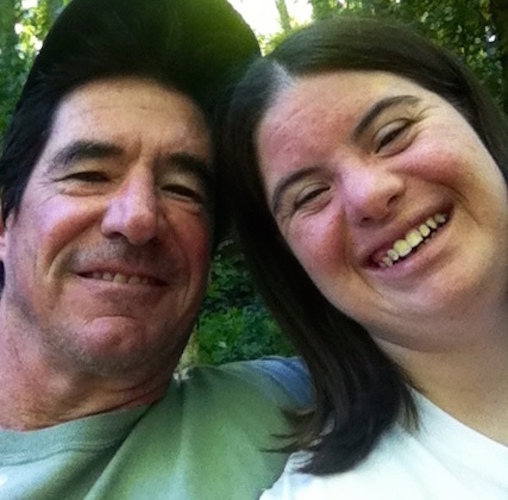The One Truth I've Learned as the Dad of a Daughter With Down Syndrome
On an especially chilly winter morning several years ago, my daughter, Jillian Daugherty, boarded the 3X bus for work and took her customary seat near the front. As the bus filled en route to downtown Cincinnati, riders were forced to stand. One woman in particular – elderly and frail, and wobbling with every stop, start and turn – was having a hard time.
Bus riders at the crack of a cold winter dawn aren’t the most charitable bunch. None moved to help the woman. None but Jillian, who offered her seat.
As Jillian stood, she overheard another passenger saying how cold she was. Jillian removed her coat and gave it to the woman.
I didn’t witness this. Someone on the bus did and sent me an e-mail about it. I’m a columnist at the Cincinnati Enquirer and have written occasionally about Jillian, born with Down syndrome 26 years ago.
“I was in a sour mood this morning, when my bus didn’t show up,” wrote a gentleman named Mike Herrel. “I had to wait an extra 40 minutes in the cold for the next bus.”
Mike struck up a conversation with Jillian after hearing someone call her Jillian. “I concluded I’d just met your daughter,” he wrote. “What a terrific person she is. She brightened the day for me and a few others packed into a bus because of her kind actions.”
My mother once said of Jillian, “She acts like the rest of the world should, but doesn’t.”
If there’s one truth I’ve discovered as a dad of a daughter with Down syndrome, it’s simply this:
Jillian is good. Her goodness inspires others to be good. She has wielded her Down syndrome like a sword of understanding. She acts like the rest of the world should.
I have no idea what inspired Jillian’s goodness, but I have a theory. People with Down syndrome own an extra chromosome. You and I have 23 pairs of chromosomes, 46 in all. Jillian has three copies of chromosome 21. Trisomy 21, it’s called, the most common form of Down syndrome.
In “An Uncomplicated Life,” my book about raising Jillian, I call the bonus wiring “Number 47”. Number 47 defines my daughter in any number of ways, most obviously in her physical appearance. But in ways subtle and vastly more important, Number 47 also rules.
From the book:
“If you believe there are no coincidences, you have to at least entertain the notion that Number 47 has a purpose beyond sadness. If you are anything other than terminally pessimistic, you believe Number 47 contains a lot that makes us good. It has to. Somewhere in that bonus wiring is a connection to compassion and kindness, a plan for how to be better.
“Number 47 isn’t a governor on Jillian’s aspirations. It’s an extra storage tank for all her good stuff.”
Jillian’s conversations begin with her wondering how everyone else is doing. My mother had knee surgery several years ago. Jillian still asks, “How is grandmother’s knee feeling?” My wife’s uncle passed more than a decade ago: “I still miss Uncle Pete,” Jillian says.
Hers is a genuine goodness, unfiltered, its sincerity unmarked by guile or agendas. It isn’t just small talk with her. Jillian knows what matters better than anyone I’ve ever encountered: Whom she loves, and who loves her. Her heart is an uncomplicated place with lots of room.
One day when she was about 18, Jillian was home sick with a deep cold. She’d spent the morning in bed, hacking mucous into a small trash basket. I’d rubbed her head and fetched her Kleenex. By mid-afternoon, she’d rallied enough that we went to lunch and the local YMCA for a workout. As we got out of the car to go into the Y, Jillian thanked me for helping her through the morning. Then she said this:
“If you love someone, they’ll love you back.”
Life essential, purely expressed.
So there’s your insight. There’s the big revelation about what Jillian, my daughter with a disability, has taught me. I’m sure I’m not alone. Knowing my daughter is a blessing. Ask the folks on that bus headed downtown on a cold winter day.
Paul Daugherty’s memoir about raising his daughter Jillian is available on Amazon.com and on his website at www.uncomplicated.life.
The Mighty is asking the following: What’s one secret or truth you wish you could tell others about your experience with disability, disease or illness? If you’d like to participate, please send a blog post to community@themighty.com. Please include a photo for the piece, a photo of yourself and 1-2 sentence bio. Check out our Share Your Story page for more about our submission guidelines.


